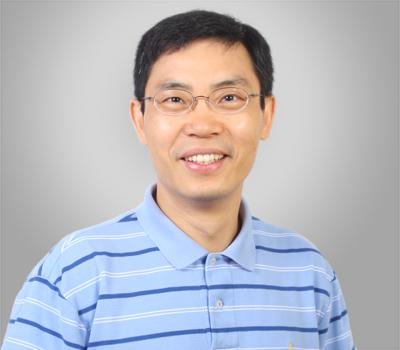
“It was not expected I would go on to college,” Huaping Liu says. Even though he was top in his class, he came from a rural area in southeastern China where he knew of no one else that went to college.
“I grew up in a pretty poor area where there was no electricity or tap water, and paper was rare, expensive stuff,” he says. “So, there were no radios, and we really didn’t know anything!”
When he was accepted to college and he needed to choose an area of study, it was pretty much by chance that he selected electrical engineering. “It just sounded fancy,” he laughs, “since we did not have any electronics.”
As it turned out, it was what he was good at and what he liked, so he kept at it. After completing his bachelor’s and master’s degrees at Nanjing University of Posts and Telecommunications in China, he applied to Ph.D. programs in the U.S. And although he jokes that his mother gave him a hard time about still being in school and unmarried when he was past 20 years old, which was rather scandalous at that time in his hometown, he says his parents were “extremely supportive” of whatever he did.
Liu specialized in wireless communications like cell phones and other wireless devices. After graduating from New Jersey Institute of Technology, Liu stayed in New Jersey and worked for Lucent Technologies (then Bell Labs) where he was part of the systems engineering team that developed the second- and third-generation cell phone systems.
At OSU his research includes wireless communication theories and wireless systems for applications like healthcare monitoring, such as tracking elderly patients in their home, and technologies for industries, such as intelligent tools that can be tracked within a building.
What Liu finds most rewarding about being a professor is being able to make an impact with both teaching and research.
He is not easy on his students. “My philosophy is that they have to go through it — not just follow me — they have to actually work to understand it,” he says. This means when a student asks a question, instead of answering it directly, he asks another question to help lead them to discover the answer on their own.
“I tell them, if I take you to New York City and you follow me from the World Trade Center to the Empire State Building, and the next time you try to walk it alone, you are going to get lost,” he says.
But the students don’t always appreciate his method, especially at first, so Liu finds it very rewarding to get an email from students after they’ve moved on to jobs to say they understand now how he made a difference in their learning.
Liu uses the same techniques when teaching his four sons, and he was pleased when they could catch on to learning for themselves at a young age. His three oldest boys are also talented ping-pong players (the youngest is still a toddler), so they travel for tournaments but also for pleasure, and he likes to spend time with them just talking or watching a little television when he gets a chance.
“The most important thing in life is to do a good job at whatever you are doing, even if that is spending time with the family, so I make sure that is high quality time,” he says.
—By Rachel Robertson

